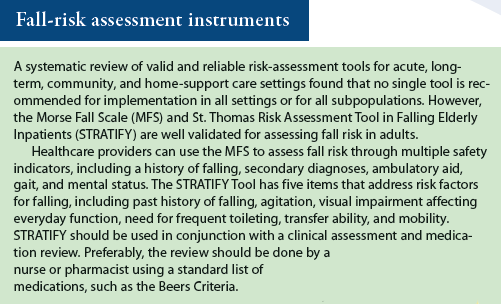The smart Trick of Dementia Fall Risk That Nobody is Talking About
The smart Trick of Dementia Fall Risk That Nobody is Talking About
Blog Article
The 30-Second Trick For Dementia Fall Risk
Table of ContentsAn Unbiased View of Dementia Fall RiskNot known Details About Dementia Fall Risk The Single Strategy To Use For Dementia Fall RiskThe Only Guide to Dementia Fall RiskHow Dementia Fall Risk can Save You Time, Stress, and Money.
Ensure that there is a marked location in your medical charting system where team can document/reference ratings and document appropriate notes connected to drop avoidance. The Johns Hopkins Autumn Risk Assessment Tool is one of many devices your staff can utilize to assist avoid adverse clinical occasions.Client falls in hospitals prevail and devastating negative events that persist despite years of initiative to minimize them. Improving communication across the assessing registered nurse, treatment group, client, and patient's most entailed family and friends may reinforce fall avoidance efforts. A team at Brigham and Female's Medical facility in Boston, Massachusetts, sought to create a standardized fall prevention program that centered around improved communication and patient and family members interaction.

The innovation group highlighted that successful implementation depends on patient and team buy-in, assimilation of the program right into existing process, and integrity to program procedures. The team kept in mind that they are facing how to guarantee continuity in program implementation throughout durations of dilemma. During the COVID-19 pandemic, for instance, a rise in inpatient drops was connected with restrictions in client engagement in addition to constraints on visitation.
What Does Dementia Fall Risk Do?
These events are generally taken into consideration preventable. To execute the treatment, organizations require the following: Access to Autumn TIPS sources Autumn TIPS training and re-training for nursing and non-nursing staff, including brand-new nurses Nursing operations that permit patient and family members engagement to carry out the drops assessment, make sure use of the prevention strategy, and conduct patient-level audits.
The results can be highly damaging, frequently increasing patient decrease and causing longer health center stays. One research study approximated keeps increased an extra 12 in-patient days after a person autumn. The Loss TIPS Program is based on interesting patients and their family/loved ones across 3 primary procedures: assessment, personalized preventative treatments, and bookkeeping to ensure that clients are participated in the three-step autumn prevention process.
The person assessment is based on the Morse Autumn Range, which is a confirmed loss risk assessment tool for in-patient healthcare facility setups. The range consists of the 6 most common factors patients in medical facilities fall: the client autumn background, risky problems (consisting of polypharmacy), use IVs and various other exterior tools, psychological standing, stride, and movement.
Each risk element relate to one or more actionable evidence-based interventions. The nurse creates a plan that incorporates the interventions and is visible to the care group, person, and family members on a laminated poster or published visual aid. Nurses develop the plan while consulting with the client and the client's family.
The Only Guide to Dementia Fall Risk
The poster acts as a communication tool with various other members of the person's treatment group. Dementia Fall Risk. The audit component of the program consists of examining the client's knowledge of their danger variables and prevention plan at the view it now system and medical facility degrees. Registered nurse champions carry out a minimum of five specific meetings a month with clients and their family members to inspect for understanding of the fall avoidance plan

An approximated 30% of these drops result in injuries, which can range in extent. Unlike various other negative events that need a standardized medical response, fall avoidance depends extremely on the needs of the patient. Including the input of individuals who know the patient ideal permits greater modification. This technique has shown to be more efficient than autumn prevention programs that are based mostly on the production of a risk rating and/or are not customizable.
Not known Facts About Dementia Fall Risk

Based on bookkeeping results, one site had 86% conformity and two sites had more than 95% compliance. A cost-benefit analysis of the Fall pointers program in 8 healthcare facilities estimated that the program price $0.88 per individual to implement and led to financial savings of $8,500 per 1000 patient-days in direct expenses connected to the avoidance of 567 tips over 3 years and eight months.
According to read the full info here the innovation group, organizations curious about implementing the program should perform a readiness analysis and falls avoidance gaps analysis. 8 In addition, organizations must make sure the essential framework and operations for execution and create an execution plan. If one exists, the organization's Fall Avoidance Job Force need to be involved in preparation.
The Best Strategy To Use For Dementia Fall Risk
To begin, organizations must make certain completion of training modules by registered nurses and nursing aides - Dementia Fall Risk. Healthcare facility personnel navigate to these guys must assess, based on the requirements of a health center, whether to use a digital health record printout or paper variation of the loss avoidance strategy. Applying teams should hire and educate nurse champs and develop procedures for bookkeeping and coverage on fall information
Staff require to be associated with the process of upgrading the operations to involve people and family members in the analysis and avoidance strategy procedure. Systems must remain in location to ensure that systems can comprehend why an autumn happened and remediate the cause. Much more specifically, nurses should have networks to give recurring comments to both personnel and system leadership so they can adjust and improve autumn prevention operations and connect systemic troubles.
Report this page